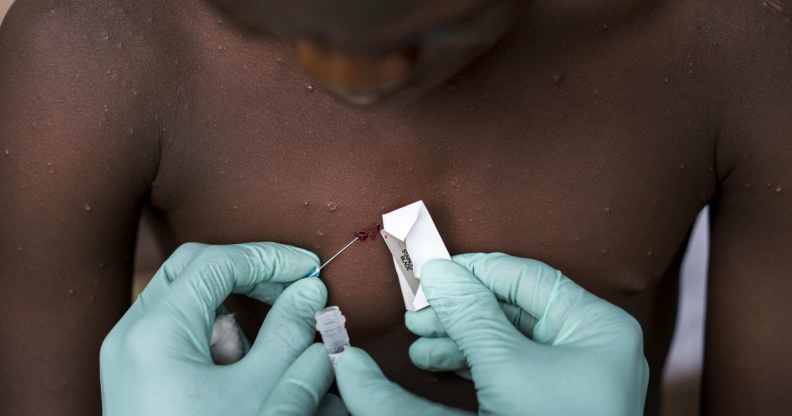Four queer men diagnosed with monkeypox in ‘rare and unusual’ UK outbreak

A teenager with suspected monkeypox. (Melina Mara/The Washington Post via Getty)
Four queer men in the UK have contracted monkeypox, health officials have confirmed.
After three cases of the rare virus were discovered in early May, the UK Health Security Agency (UKHSA) said on Monday (16 May) that three men in London and one in the northeast have been diagnosed with monkeypox.
The four all acquired monkeypox in the capital, and have no known links with the three previous cases.
Because the virus is spread through close contact, officials are advising queer men “to be alert to any unusual rashes or lesions on any part of their body, especially their genitalia, and to contact a sexual health service if they have concerns”.
The first infection was discovered 7 May in a person who had returned from Nigeria. The virus was recorded for the first time in the UK in 2018.
Monkeypox – named because it was first seen in research monkeys – is spread by very close contact with an infected person, the UKHSA said. Most people recover within only a few weeks but can become more serious.
“This is rare and unusual,” said UKHSA chief medical adviser Dr Susan Hopkins, adding that the agency is working with local and international health officials to identify and contact trace any further cases.
“We are contacting any potential close contacts of the cases to provide health information and advice.”
Some of the patients diagnosed with monkeypox are in specialist infectious disease units at the Royal Free Hospital, Royal Victoria Infirmary in Newcastle upon Tyne and Guys’ and St Thomas’ in London.
UKHSA has detected four new cases of monkeypox – three in London and one in the North East of England ?Thread:
These cases do not have known connections to the previous confirmed cases announced on May 7 and May 14. Read more: https://t.co/e8jksQo9Av
— UK Health Security Agency (@UKHSA) May 16, 2022
What is monkeypox and what are the symptoms?
Monkeypox, milder than other smallpox diseases, mostly occurs in Central and Western Africa.
It typically begins with flu-like symptoms and swollen lymph nodes before developing into a rash on the face and lesions across the body, especially the genitalia, according to the NHS. The rash eventually becomes a scab which later falls off.
No special precautions are advised at the time for the general public, the agency added, given that the virus does not spread easily.
Those experiencing similar symptoms are recommended to contact sexual health clinics and alert them ahead of visits and confidentiality would be ensured.
The United Nations stressed that there is “minimal risk” of transmission as all cases so far have been isolated. UK health officials have also raised the cases with the World Health Organisation.
“It is important to emphasise that monkeypox does not spread easily between people and the overall risk to the general public is very low,” added Dr Colin Brown, director of clinical and emerging infections for the UKHSA.
“UKHSA and the NHS have well established and robust infection control procedures for dealing with cases of imported infectious disease and these will be strictly followed.”

